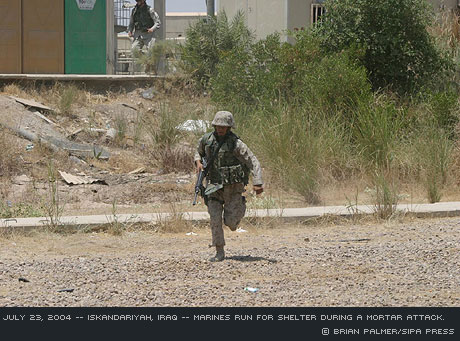|
|
 |
Last
week I met an Army Sergeant from the 10th Mountain Division while
washing my three shirts, each of which smelled like rancid milk from
countless wearings under a thick, synthetic-covered bulletproof vest.
It's a common odor around Camp Iskandariyah. The Sergeant has lived
at this base since September 2003, he told me, running patrols around
town, hunting for IEDs -- improvised explosive devices -- and getting
mortared.
"You can't fight an insurgency," he told me point blank.
"It will end when they want it to." The men who lob mortarsinto
the base or shoot rockets and small arms at patrols simply melt away
before U.S. forces can mount an effective response, he said. "You
just have to keep your head in the game." Stay alert, go home
alive, the Sergeant said finally as he stuffed his dirty fatigues
into an overworked washing machine.
The first explosion, at 1300, sounded like thunder, though less crackly,
more percussive and resonant -- thunder strapped to a sonic boom.
Captain Ray Spaulding, a company commander in the 24th MEU, and Master
Sergeant Allen Benjamin, his noncommissioned counterpart, leapt up
instinctively, pulled on their flak vests, and slapped on their Kevlar
helmets.
"Come on," the Master Sergeant yelled at me. As calmly as
I could manage, I put on my body armor and collected my cameras, then
I followed them into the sharp and disorienting daylight. For a moment,
soldiers and Marines milled around anxiously. Mortar rounds exploded
meters from the building we occupied. Another explosion. A small cloud
of dust bloomed not too far -- but not too close -- to the gaggle
of men.
During the momentary lull, soldiers sprinted toward bomb shelters
and piled in. "Push in, push in," Marines shouted. "Nut
to butt! Nut to butt!" another screamed.
Another explosion, and then there were howls from the entrance of
the shelter. Exploding rounds had showered Marines with shrapnel.
A sergeant was wounded on the inside of the upper thigh and in the
calf of his other leg. At some point during the attack, Lance Corporal
Vincent Sullivan, was hit in the chest and in the eye. At least six
other Marines were wounded (some seriously enough to be evacuated
to Germany and to the United States) Their fellow Marines, soldiers,
and corpsmen carried them from the impact area to relative safety.
I trotted after Master Sergeant Benjamin, who ran from the shelters
to the Battalion Aid Station where the wounded were being treated.
As the company's senior noncommissioned officer, it was his responsibility
to account for everyone in the company and determine who was hurt.
During my first few moments in the small aid station, I couldn't distinguish
between the wounded and the unscathed. There were too many people
doing too many things moving in too many directions. To my left, there
was a young man on the floor with a patchwork of bandages on his legs.
One dressing was already stained red. To the right, I saw the pained
face of another young Marine whose legs were covered with a green
blanket and whose swollen right hand was swathed in gauze. Marines,
Navy Corpsmen, and Army medics surrounded them, working and shouting.
In another corner of the room, a huge Marine stood silently, half
of his face streaked red with blood. Methodically and unhurriedly,
he daubed at his head wound as if cleaning a nick suffered during
a morning shave.
I shot only two photographs inside the BAS, both of an unwounded Marine
who had carried a comrade there. A fist-sized splotch of blood dyed
his helmet. "What the fuck is he doing in here?" he shouted
at me. I hadn't photographed the wounded men, I yelled back, but the
Marine, a lance corporal, glared at me still. "Anyone who's not
medical needs to get out of here. Now," shouted the Battalion
Commander, Lt. Colonel Robert Durkin. |
 |
 |
|

